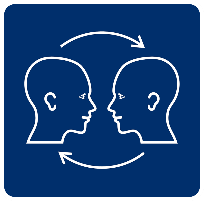- How could my child benefit from AAC?
If your child finds communication difficult because they have little or no clear speech, or struggle to understand spoken language they might benefit from some form of AAC. This could be the use of signs or symbols, or a communication aid. AAC covers a wide range of strategies and systems to support people who have a condition that affects their ability to communicate using spoken language either temporarily or in the long term. This could be the result of a congenital problem, such as cerebral palsy, or an acquired condition, for example a head injury.
Some people use AAC to express themselves; others use it to help them understand what is said to them.
- How can I find out what might help my child?
Your local speech and language therapist (SLT) should be able to advise you whether your child would benefit from AAC. They can refer you onwards to a local specialist therapist or regional specialist centre for a detailed assessment.
We run regular Information Days around the UK at which you can get hands-on with communication aids and meet the suppliers. We have also published a series of “Focus on…” leaflets that offer an introduction to various aspects of AAC.
- What types of AAC are there?
There are two types of AAC: “aided” and “unaided” systems. Unaided systems do not require any equipment, by typically involve signing, eye pointing, facial expression, gesture or a combination of these.
Aided systems may be either low-tech or hi-tech. Low-tech systems, such as picture, symbol, word or alphabet boards and books do not need power to work. They can also include the use of everyday objects and objects of reference – these are sometimes used to give people with complex learning needs clues about what is about to happen.
Hi-tech systems require a power supply to work. Simpler devices, for example, can play a single recorded message. Most gadgets or software speak and/or produce text. These may be a mobile device, tablet or a laptop. There are also very complex systems where the user selects a sequence of pictures, symbols or letters and this generates spoken output.
Most people who use AAC use a combination of aided and unaided systems.
- How do I know what is the right AAC system for my child?
No single AAC system is right for everyone – each has pros and cons. What would best suit your child will depend on many different factors such as their age, current abilities and circumstances. The people with whom they are communicating must also be taken into account.
A speech and language therapist can talk you through the wide range of options and give you advice. A specialist AAC assessment centre can also offer guidance as well as an opportunity to try a few systems out (see here for a list in England). If your child will most benefit from using a hi-tech system it is sometimes possible to arrange a short-term loan or rental of a device. This might be through the assessment centre or directly from the supplier. A short trial will give you a better idea of whether the system will work for your child and family.
- Can I talk to other parents whose child uses AAC?
Your speech and language therapist might be able to put you in touch with other AAC users or their families in your local area. Contact a Family brings together and supports families with disabled children – they too might know of other parents in your area.
The group 1Voice runs regular events such as family fun days – these offer an opportunity to meet parents and their children, and enjoy presentations by AAC users on how their system helps their independence.
- How do I get funding for my child’s communication aid?
Your child’s education, health and care (EHC) plan (England and Wales) will identify if they need a communication aid. If so, your local authority is obliged to fund it, but this may be difficult – devices can be expensive and local authorities often have very tight budgets. Currently health authorities are sometimes able to offer support for funding, but this is not common.
Many people resort to applying for charitable funding to pay for hi-tech communication aids. Some charities may also be able to offer support with fundraising. These include the Sequal Trust and the Aidis Trust.
Many communication aid suppliers have useful funding information on their websites.
See also
- FAQs – AAC and Autism Spectrum Disorder (ASD)
- FAQs – AAC and cerebral palsy (CP)
- FAQs – AAC and developmental difficulties
- FAQs – AAC and employment
- FAQs – AAC and general paediatric care
- FAQs – AAC and hospitalisation
- FAQs – AAC and locked-in syndrome
- FAQs – AAC and Parkinson’s Disease (PD)
- FAQs – AAC and stroke and aphasia
- FAQs – AAC and training
- FAQs – AAC assessment and clinical decision-making
- FAQs – the law, policy and services






